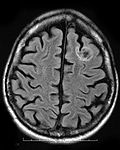Difference between revisions of "Dysembryoplastic neuroepithelial tumour"
Jump to navigation
Jump to search
Jensflorian (talk | contribs) (+ references +histology +IHC) |
Jensflorian (talk | contribs) (→Microscopic: +molecular) |
||
| Line 36: | Line 36: | ||
*MIB-1 (Ki-67) 0-8% | *MIB-1 (Ki-67) 0-8% | ||
Molecular: | Molecular:<ref name="pmid27791984">{{cite journal |vauthors=Fina F, Barets D, Colin C, Bouvier C, Padovani L, Nanni-Metellus I, Ouafik L, Scavarda D, Korshunov A, Jones DT, Figarella-Branger D |title=Droplet digital PCR is a powerful technique to demonstrate frequent FGFR1 duplication in dysembryoplastic neuroepithelial tumors |journal=Oncotarget |volume=8 |issue=2 |pages=2104–2113 |date=January 2017 |pmid=27791984 |pmc=5356784 |doi=10.18632/oncotarget.12881 |url=}}</ref> | ||
* BRAF V600E | |||
* FGFR1 tandem duplication (FGFR1-TKDD) | |||
DDx: | DDx: | ||
*[[Oligodendroglioma]]. | *[[Oligodendroglioma]]. | ||
Revision as of 10:33, 26 October 2020
Dysembryoplastic neuroepithelial tumour, abbreviated DNET[1] and DNT,[2] is a rare neuropathology tumour that is associated with epilepsy.
General
- Common benign mixed neuronal-glial tumour cause of drug resistant epilepsy.[3]
- Paediatric population.
- WHO grade I (ICD-O: 9413/0)
Gross/radiology
- Temporal lobe, usually cortical.
- Variable architecture:[4] cystic, solitary nodular, multinodular.
- Adjacent cortical dysplasia in up to 80%[8]
Microscopic
- Specific glioneuronal element:
- Axonal columns oriented to the surface
- Floating neurons in eosinophilic matrix
- Lined by cells similar to oligodendrocytes:
- Large central nuclei with indentations.
- Multiple small nucleoli (common).
- Clear cytoplasm.
- few stellated astrocytes
IHC:[10]
- MAP2+ve in oligodendroglia-like cells
- CD34 in 61%
- Calbindin in 57%
- Nestin in 86%
- MIB-1 (Ki-67) 0-8%
Molecular:[11]
- BRAF V600E
- FGFR1 tandem duplication (FGFR1-TKDD)
DDx:
- Oligodendroglioma.
- Astrocytoma, protoplasmatic variant.
- infiltrative microcystic formations may mimic glioneuronal element
- Ganglioglioma.
- has reticulin fibers, lymphocytic cuffs and large cysts.
Images
www:
See also
References
- ↑ Alexander, H.; Tannenburg, A.; Walker, DG.; Coyne, T. (Jan 2015). "Progressive dysembryoplastic neuroepithelial tumour.". J Clin Neurosci 22 (1): 221-4. doi:10.1016/j.jocn.2014.07.022. PMID 25311417.
- ↑ Matyja, E.; Grajkowska, W.; Kunert, P.; Marchel, A. (Oct 2014). "A peculiar histopathological form of dysembryoplastic neuroepithelial tumor with separated pilocytic astrocytoma and rosette-forming glioneuronal tumor components.". Neuropathology 34 (5): 491-8. doi:10.1111/neup.12124. PMID 24735014.
- ↑ Cataltepe, O.; Turanli, G.; Yalnizoglu, D.; Topçu, M.; Akalan, N. (Apr 2005). "Surgical management of temporal lobe tumor-related epilepsy in children.". J Neurosurg 102 (3 Suppl): 280-7. doi:10.3171/ped.2005.102.3.0280. PMID 15881751.
- ↑ 4.0 4.1 4.2 O'Brien, DF.; Farrell, M.; Delanty, N.; Traunecker, H.; Perrin, R.; Smyth, MD.; Park, TS. (Dec 2007). "The Children's Cancer and Leukaemia Group guidelines for the diagnosis and management of dysembryoplastic neuroepithelial tumours.". Br J Neurosurg 21 (6): 539-49. doi:10.1080/02688690701594817. PMID 18071981.
- ↑ Daumas-Duport, C. (Jul 1993). "Dysembryoplastic neuroepithelial tumours.". Brain Pathol 3 (3): 283-95. PMID 8293188.
- ↑ Daumas-Duport, C.; Scheithauer, BW.; Chodkiewicz, JP.; Laws, ER.; Vedrenne, C. (Nov 1988). "Dysembryoplastic neuroepithelial tumor: a surgically curable tumor of young patients with intractable partial seizures. Report of thirty-nine cases.". Neurosurgery 23 (5): 545-56. PMID 3143922.
- ↑ Sung, CO.; Suh, YL. (Mar 2009). "Different pattern of expression of nestin in the non-specific form of dysembryoplastic neuroepithelial tumors compared to the simple and complex forms.". J Neurooncol 92 (1): 7-13. doi:10.1007/s11060-008-9725-z. PMID 18998057.
- ↑ Sakuta, R.; Otsubo, H.; Nolan, MA.; Weiss, SK.; Hawkins, C.; Rutka, JT.; Chuang, NA.; Chuang, SH. et al. (Apr 2005). "Recurrent intractable seizures in children with cortical dysplasia adjacent to dysembryoplastic neuroepithelial tumor.". J Child Neurol 20 (4): 377-84. PMID 15921242.
- ↑ Daumas-Duport, C. (Jul 1993). "Dysembryoplastic neuroepithelial tumours.". Brain Pathol 3 (3): 283-95. PMID 8293188.
- ↑ Thom, M.; Toma, A.; An, S.; Martinian, L.; Hadjivassiliou, G.; Ratilal, B.; Dean, A.; McEvoy, A. et al. (Oct 2011). "One hundred and one dysembryoplastic neuroepithelial tumors: an adult epilepsy series with immunohistochemical, molecular genetic, and clinical correlations and a review of the literature.". J Neuropathol Exp Neurol 70 (10): 859-78. doi:10.1097/NEN.0b013e3182302475. PMID 21937911.
- ↑ "Droplet digital PCR is a powerful technique to demonstrate frequent FGFR1 duplication in dysembryoplastic neuroepithelial tumors". Oncotarget 8 (2): 2104–2113. January 2017. doi:10.18632/oncotarget.12881. PMC 5356784. PMID 27791984. https://www.ncbi.nlm.nih.gov/pmc/articles/PMC5356784/.
- ↑ Fujisawa, H.; Marukawa, K.; Hasegawa, M.; Tohma, Y.; Hayashi, Y.; Uchiyama, N.; Tachibana, O.; Yamashita, J. (Dec 2002). "Genetic differences between neurocytoma and dysembryoplastic neuroepithelial tumor and oligodendroglial tumors.". J Neurosurg 97 (6): 1350-5. doi:10.3171/jns.2002.97.6.1350. PMID 12507133.




